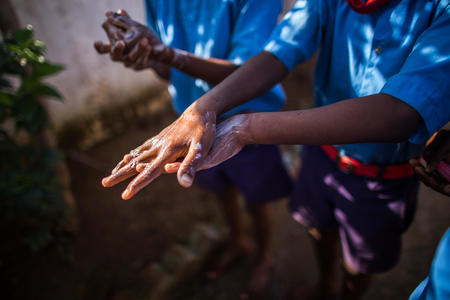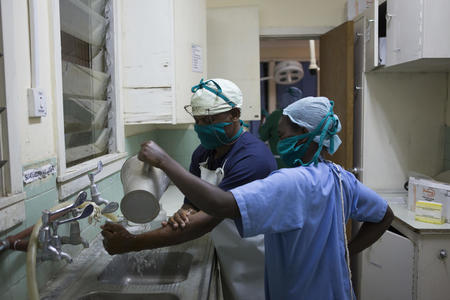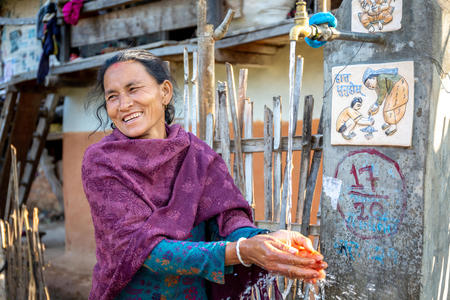How can we ensure everyone can wash their hands with soap and water, to protect lives from COVID-19?

Om Prasad Gautam, Khairul Islam and Erik Harvey discuss the importance of handwashing with soap and water in reducing the risk of infection from COVID-19, and highlight what the water, sanitation and hygiene sector can and should do in response to the coronavirus pandemic.
COVID-19, the illness caused by the coronavirus that emerged at the end of 2019, is spreading around the world fast, and specific treatment, including a vaccine, is not yet available. This global pandemic is a public health emergency, creating high levels of public anxiety and having devastating impacts on people’s health, education and livelihoods.
To date COVID-19 has spread mostly in high-income nations with relatively strong health systems. However, the impact will be much greater if it continues to spread to countries with weaker health systems. The effects on populations in low- and middle-income (LMIC) nations would be catastrophic, not just as a direct consequence but also by further weakening critical healthcare services.
Handwashing with soap is vital to fighting coronavirus
The COVID-19 pandemic is unfolding rapidly, and we still need to know more about it. But one thing we know for sure is that, to protect people and reduce the risk of infection from the virus, washing hands with soap and water frequently and thoroughly is crucial.
Simply washing both hands with soap and water:
- before eating or feeding
- after going to the toilet
- before touching the nose or face
- after touching areas frequently exposed to potential contamination
can help protect people from catching and prevent them from spreading coronavirus.
Hand hygiene has many health benefits
Handwashing with soap is life-saving. The most cost-effective public health intervention, it also protects people from life-threatening illnesses such as cholera, other diarrhoeal diseases, pneumonia and intestinal worms.
It has been linked to:
- 16–23% reduction in incidence of acute respiratory infection
- 50% reduction in pneumonia
- Substantial reduction in neonatal infections
- Up to 48% reduction in risk of endemic diarrhoea (reference 1; reference 2).
Infection-related infant deaths could be reduced by 27% by improving handwashing practices in healthcare facilities, and a further 40% by handwashing in the postnatal period.
Yet availability of handwashing facilities in low- and middle-income countries is poor. Globally, 40% of households still don’t have handwashing facilities with soap and water, and just 19% of people wash their hands with soap after defecating. Almost half of healthcare facilities (43%) lack basic hand hygiene facilities at points of care, and nearly half of schools (47%) in developing countries lack handwashing facilities. This makes good hand hygiene impossible for millions of people, contributes to the spread of infections and makes tackling this pandemic very difficult.
At WaterAid, we have always promoted handwashing with soap and water as part of our ongoing water, sanitation and hygiene (WASH) and hygiene behaviour change programming. In the face of the threat posed by COVID-19, we will scale up our efforts to improve handwashing with soap. We will support governments’ and partners’ efforts to keep people safe by helping in this area of our expertise. This is the moment we all need to act together to change people’s hygiene behaviours – for a generation, on a massive scale.
What should WASH agencies do to limit the spread of coronavirus?
Tackling COVID-19 requires a comprehensive package including preventive, protective and curative interventions. Poor WASH conditions and lack of hygiene practices contribute to the spread of infections, and make it very difficult to control the COVID-19 epidemic. While the health sector focuses on disease surveillance, case detection, treatment and case management, the WASH sector and agencies working in WASH and hygiene promotion should come together to focus on the prevention and protection side of the response.
We envision the WASH sector can make the following urgent contributions:
- We must all take a ‘do no harm’ approach while promoting hygiene. Public gatherings such as community events, cultural and sports events, person-to-person contact and large-scale workshops and seminars would create high risks of transmitting the virus. It is important to establish phased responses based on country contexts and how the virus is spreading there.
- WASH clusters at country and regional levels should be activated or established, contribute to the overall preparedness plan, and lead on the promotional aspects of its preventive and protective measures. WASH and health sectors need to work together on this.
- WASH agencies (all development partners and the private sector) and leaders of government line ministries together need to review existing hygiene promotional materials, re-design packages, and include comprehensive COVID-19-sensitive behaviours, according to global guidance. It is important to develop and add print, audio and visual materials to mobilise digital, social and mass media. And to offer comprehensive, consistent, concise messages to the public, to counteract any misinformation around COVID-19.
- The WASH sector, in coordination with health, education and others, could launch large-scale nationwide hygiene promotion campaigns, focusing on key behaviours and targeted to the public and specific groups. It is important to use multiple promotional touchpoints, achieve high reach with high frequency, and maintain fidelity to avoid confusion.
- We can support governments to improve hygiene facilities in key locations such as healthcare settings, schools, bus stands, market places and other public places.
- The sector can work with key decision makers to accelerate action, for example by supporting governments to offer proper guidance for organisations and major employers in each country on what to do to contribute. And it can coordinate with health, education, development partners, private sector and civil society organisations to achieve a coordinated response.
- The sector can reassess the situation at a later timepoint, based on disease transmission dynamics, in coordination with the health sector, and discuss courses of action. Once social distancing measures are lifted, we can build longer-term sustained behaviour change and resilient WASH programmes.
- WASH and health sector donors can provide rapid, flexible funding and technical assistance to government-led efforts to promote good hygiene and build WASH systems. And they can invest in sustained behaviour change programmes and WASH services, as a core priority in ensuring global health security and preventing future pandemics.
- The sector can consolidate lessons for better promotion now and in any future response, and reduce the evidence gap from programmatic lessons and research.
- WASH services such as water supply systems and sanitation services must be functional where available in this crisis, so healthcare facilities can provide quality of care and those isolating at home can access facilities that ensure their dignity. WASH sector agencies and service providers should support this.
- COVID-19 will impact on people in different ways. The WASH sector needs to support gender-inclusive and socially inclusive responses in hygiene promotion and avoid any stereotyping. It needs to recognise that people who are most marginalised are worst affected, and ensure messaging reaches everyone and speaks to different people.
How is WaterAid engaging in the response to COVID-19?
WaterAid is not a medical agency and we do not deal with disease surveillance or case management, including treatment. As a WASH agency and a global leader in hygiene promotion and behaviour change, we will be supporting national governments and government-led mechanisms to promote hygiene, focusing on behaviours that are key in controlling and preventing the spread of coronavirus.
We have strong partnerships with national governments and civil society groups in the areas where we work. In many countries we are already partnering with the government to roll out large-scale hygiene promotion initiatives. Follow our response on our global COVID-19 hub page
In our operational country programmes, we will support governments to design hygiene promotion packages and support them to implement mass media, digital and social media campaigning to amplify hygiene promotion messaging, linking with COVID-19. In coordination with national governments, we will intensify this response in a few highly populous countries with recorded cases where controlling the coronavirus would reduce its global impact and protect small neighbouring countries. Similarly we will intensify the response where we have existing hygiene programmes.
Our hygiene promotion initiatives will focus on key behaviours that are critical for reducing spread of coronavirus, based on WHO recommendations and national Ministry of Health priorities. Below is the inclusive set of behaviours we will be contextualising for each country.
|
Handwashing with soap |
Frequently washing both hands with soap and water regularly and thoroughly (especially before eating and feeding; before touching the nose or face; after going to the toilet; after exposure to any dirt, dust, fluids or frequently touched surfaces). |
|
Respiratory hygiene |
Covering nose and mouth when coughing and sneezing (sneezing or coughing into the elbow and disposing of a tissue if used into a closed bin), followed by handwashing with soap. |
|
Maintaining social distancing |
Avoiding close contact and maintain at least 2m distance from anyone coughing or sneezing. Maintain social distancing, for example by avoiding large gatherings. Use non-contact greetings, not, for example, handshakes or hugs. |
|
Cleanliness |
Cleaning frequently touched surfaces regularly, such as door handles, mobile phones, light switches, lift buttons, working surfaces and railings using disinfectant. |
|
Referral |
Stay at home if you feel unwell. If you have either fever or cough / difficulty breathing, seek immediate medical attention and call in advance. Follow advice of your Ministry of Health. |
Our phased response to COVID-19
We are taking a phased approach that responds to the dynamic nature of coronavirus transmission and the diverse needs of the countries we are targeting. All hygiene promotion campaigns will be in partnership or coordination with the government.
Phase 1 (two to three months). We foresee this being the critical window for curtailing the spread of coronavirus in LMIC nations. We aim to focus on three key major elements:
- Large-scale hygiene promotion. To minimise risk through interpersonal contact we will focus on mass media, digital media, printed materials and social media as our primary delivery channels. Specifically, we will create visual reminders or cues (e.g. to be placed near handwashing facilities), and public service announcements for billboards, printed advertising, radio, television and social media. These will feature local celebrities demonstrating the target behaviours and leading by example. All our work will be aligned with established government-led campaigns. Our delivery will focus on attaining high coverage with increased frequency while maintaining the fidelity of the promotion.
- Supporting governments to improve hygiene facilities in key locations. Evidence shows that during outbreaks people typically start washing their hands more because they are worried. However, in LMIC settings water and soap are less commonly available, which can create a major barrier that prevents people from doing the right thing. Subject to availability of budget, we will support construction of handwashing facilities in key public locations (e.g. markets and bus stops). Locations will be identified in consultation with government and the facilities handed to them to manage.
- Working with key decision makers to accelerate action. To respond rapidly to the coronavirus threat, we need to engage as many organisations as possible in prevention efforts. It is important to start working with governments to prioritise embedding hygiene behaviour change at the core of national economic development plans. We will support governments to have virtual coordination with organisations and major employers in each country, so they can advise them on how they can contribute. Where necessary, we will also facilitate better sectoral and cross-sectoral coordination.
Phase 2 (following 6 months). At the end of phase one, we will reassess the situation based on the disease transmission dynamics at the time, and discuss with governments the courses of action. In this phase we will ideally support government and civil society partners to intensify the ongoing campaign through interpersonal communication or events (if restrictions are lifted), while continuing the digital and mass media campaign. We will also focus on promoting these behaviours through our existing programmes.
This phase will also include long-term planning and actions for sustainable hygiene behaviour change programmes through ongoing and new programmes in countries.
How can we make interventions more effective after COVID-19 response?
We believe in sustainable behaviour change programming. Among the reasons for continued low coverage of good hygiene in the sector are lack of prioritisation of hygiene; ineffective, knowledge-focused interventions; positioning hygiene as an add-on activity; designing interventions based on expert thinking; siloed implementation of hygiene programmes; lack of dedicated institutional mechanisms and financing; and output-focused monitoring mechanisms.
Although recognition of the importance of behaviour change is growing, urged on by this pandemic, it is still highly neglected across WASH, health, education and nutrition sectors. We are fully aware that the fear of spreading diseases acts as a stimulus for people to demand behavioural products and look for potential behaviours to practise now. Sustaining this desire will be paramount. We all should be conscious of hygiene all the time, and practise handwashing with soap along with other key behaviours as part of our normal routines, to avoid any future outbreaks.
We will continue driving our innovative, effective and robust hygiene programmes. They are designed through a creative process, informed by formative research and use of people’s emotions, environmental cues, reminders, nudges, behavioural products and creating social desire and norms to change behaviours. We will continue investing in enhancing sectoral capacity to integrate and scale implementation of behaviour change programmes through WASH, health, nutrition and education sectors.
In the long term, WASH and health agencies should abandon ineffective traditional educational approaches to hygiene promotion, focusing instead on sustained behaviour change programmes at scale. The sector should embrace behaviour-centric approaches in which we truly listen to communities to understand universal behavioural determinants – their drivers, motives and ambitions – and design and implement context-specific behaviour change interventions using emotions to engender lasting positive behaviour change.
Crucially, we all need to support governments to increase their capacities to execute, prioritise and allocate funding for hygiene behaviour change and WASH interventions. And we need to demonstrate how much more effective such campaigns can be to preventing future outbreaks, epidemics and pandemics.
Om Prasad Gautam is Senior WASH Manager for Hygiene at WaterAid UK (our global lead on hygiene), Khairul Islam is WaterAid’s Regional Director for South Asia and Erik Harvey is Programme Support Unit Director at WaterAid UK.
If you have a question for WaterAid about coronavirus, please email Om here.






